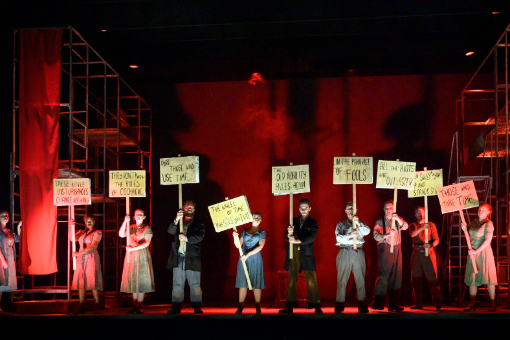 United Kingdom Kurt Weill and Georg Kaiser, The Silver Lake (Der Silbersee): Soloists, Choir of Streetwise Opera and English Touring Opera Orchestra / James Holmes (conductor). Hackney Empire, London, 7.10.2019. (AK)
United Kingdom Kurt Weill and Georg Kaiser, The Silver Lake (Der Silbersee): Soloists, Choir of Streetwise Opera and English Touring Opera Orchestra / James Holmes (conductor). Hackney Empire, London, 7.10.2019. (AK)

Production:
Director – James Conway
Set designer – Adam Wiltshire
Lighting designer – David W Kidd
Choreographer – Bernadette Iglich
Cast:
Olim – Ronald Samm
Severin – David Webb
Fennimore – Luci Briginshaw
Frau von Luber – Clarissa Meek
Baron Laur/Lottery agent – James Kryshak
Shop girls – Abigail Kelly, Hollie-Anne Bangham, Rosanna Harris, Amanda Wagg
Gravediggers/Youths – David Horton, Andrew Tripple, Jan Capinski, Bradley Travis, Maciek O’Shea
Narrator – Bernadetta Iglich
James Conway’s production of Weill’s The Silver Lake triumphs in spite of the by now customary blank stage with moveable metal constructions of many operatic productions in many opera houses. While such staging is often problematic, Conway here fills the space with inventions which serve both the plot and the music, and at the same time they also genuinely entertain. The blank stage could be boring to look at but Conway’s surtitles are not restricted to the usual overhead electronic display. On the contrary, one needs to be fully attentive to follow the surtitles written on banners, placards, flags and other soft surfaces: all of these are carried, held up and shifted by cast members in the context of staging the plot.
The cast’s involvement is theatrical but the participation of the amateur choir of Streetwise Opera (London group) involves real people and is fully appropriate to the text of the play. There is a nagging doubt in my mind that perhaps not all the choir were amateurs: they sang with purity and unity as well as of true artistic standard. However, even if only a portion of the choir represented genuine street people, the spirit of the play was appropriately served.
The plot is about rich people, poor people, exploitation, fighting for survival, remorse and hope for a better future for all. The main storyline concerns hungry Severin who steals food and is shot by Olim the policeman. Olim feels guilty and when he wins the lottery, he buys a castle and dedicates himself to looking after Severin. However, Severin is unaware who his benefactor is and plans revenge on the man who shot him. In the meantime, the aristocratic housekeeper Frau von Luber tricks Olim into signing the castle over to her and tells Severin that it was Olim who shot him. Severin, influenced by Fennimore, cannot bring himself to implement his longed for revenge: he and Olim walk together to the silver lake which will provide the route for a better life.
The work alludes to conditions in Germany in the 1920s and early 1930s – it was premiered on 18th February 1933 in Leipzig (as well as in Erfurt and Magdeburg simultaneously) and was banned by the Nazis two weeks later – but the parallels with today’s conflicts (in the UK and elsewhere) are crystal clear. Many people, especially those who are dispossessed, go hungry or rely on food banks while elsewhere speculative wastage of food is evident.
The extensive text of The Silver Lake renders the work of Weill and Georg Kaiser a play with music – this is the official designation for it – but, with the text substantially cut (as more often than not), the qualification Singspiel fits the material well. Conway made huge cuts in the four-hour text; he balanced spoken words and Weill’s 90-minute music well.
This performance was my first encounter with the work: I could not help feeling that I was in the world of Weill’s The Seven Deadly Sins (which I encountered many times), so I kept expecting some songs from there. Those songs did not come but Weill’s music in The Silver Lake is top quality Weill: exciting, deeply moving as well as perfect for the plot and actual words. All solo and ensemble songs were presented in German but the chorus sang in English. This solution is likely to have been decided for pragmatic reasons but it made the German context from the 1920s/1930s and its relevance in current England more pointed.
To my ears, the role of Olim is meant to be for a baritone but, according to biographies in the programme notes, Ronald Samm is a tenor with important tenor roles (such as Florestan in Fidelio, Siegmund in The Valkyrie, and Walther in The Mastersingers) under his belt. Either way, Samm portrayed and sang the part of the policeman, who first shoots a hungry man (Severin) for stealing food but makes up for it later, with credibility and distinction. Without doubt, David Webb is a tenor and so is the role of Severin which Webb presented with integrity and dedication. Soprano Luci Briginshaw (Fennimore) gave a charming and beautifully sung presentation of the downtrodden and homeless poor relation to Frau von Luber (the impoverished aristocrat who manipulates her way back to riches). Brigginshaw is fully credible as Fennimore who is the catalyst for the final reconciliation as well as for hope for a better future.
Conductor James Holmes is fully versed in Weill’s music and passionate about it. He inspired his thirty-piece orchestra and the choir of Streetwise Opera to authentic Weill sounds and exciting music making. Holmes is a Trustee of the Kurt Weill Foundation, New York. In 2018 he became only the seventh ever recipient of the Foundation’s Lifetime Achievement Award: clearly deservedly so.
Agnes Kory
For more about English Touring Opera click here.